广西陆川县乌石镇初级中学七年级英语下册《unit 2 what time do you go t
人教版七年级英语下册《Unit2 What time do you go to school Per

《Unit2 What time do you go to school Period3》教案Title Unit2 What time do you go to school?The typeOf lessonsNewlessonNumber ofsectionsDesigner Auditor Teacher DateAnalysis of the Teaching Material 【Curriculum requirements】1. Master grammar focus.2. Master the usage of always, usually and never.3. Learn to use the language points in this section.Analysis of the Teaching Material:This period is revision to section A. We’ll summarize grammar focus and do some drills.Teaching Aims and Demands Knowledge Objects:Key structures:What time do you usually get up? I usually get up at six thirty.What time do they get dressed? They always get dressed at seven twenty. What time does Rick eat breakfast? He eats breakfast at seven o’clock. What time does Scott go to work? He always goes to work at eleven o’clock. He’s never late.When do your friends exercise? They usually exercise on weekends.Ability Objects:Train Ss’ ability of summarizing.Train Ss’ability of solving problem using the sentence structures they learned.Moral Objects:Wasting time is wasting our life. Use our time effectively.Teaching Key Points And Teaching Difficult Points Teaching Key Points:Key structures:What time do you usually get up? I usually get up at six thirty.What time do they get dressed? They always get dressed at seven twenty. What time does Rick eat breakfast? He eats breakfast at seven o’clock. What time does Scott go to work? He always goes to work at eleven o’clock. He’s never late.When do your friends exercise? They usually exercise on weekends. Teaching Difficult Points:Train Ss’ ability of summarizing.Train Ss’ability of solving problem using the sentence structures they learned.TeachingaidsText book, blackboardDesign ofperiodPeriod 3 section A Grammar Focus & 3a-3cTeaching Procedures Teacher-student InteractionReviseStep I ReviewReview by checking homework.Step II Grammar FocusGuide Ss to conclude what we learn in last two classes. Invite five pairs of Ss to read the sentences in Grammar Focus to the class.Step III 3aRead the instruction to the class.Ask a S to say the meaning of always, usually and never. Ask Ss to write answers or questions by themselves.Check the answers together.Step IV 3bRead the instruction to the class.Divide the Ss into three teams. The first team writes about the things they always do, the second team writes about the things they usually do, and the third team writes about the things they never do.Invite a S from each team to write out their answer on the blackboard. (Check grammar mistakes if necessary.)Step V 3cRead the instruction to the class.Divide the Ss into groups of four. One as an interviewer interviews the other three Ss what time they do these activities. Ask two or three interviewers to give reports to the class like the speech bubble.Step VI SummaryIn this class, We summarized grammar focus and did some drills. After class, finish all the exercises on this page and recite the sentences in Grammar Focus.Guide Ss to conclude what we learn in last two classes. Walk around the classroom. Offer help if needed.Walk around the classroom. Offer help if needed. Check grammar mistakes if necessary.Walk around the classroom. Offer help if needed.Blackboard DesignUnit2 What time do you go to school?Key structures:What time do you usually get up? I usually get up at six thirty.What time do they get dressed? They always get dressed at seven twenty. What time does Rick eat breakfast? He eats breakfast at seven o’clock. What time does Scott go to work? He always goes to work at eleven o’clock. He’s never late.When do your friends exercise? They usually exercise on weekends.Homework Finish all the exercises on this page. Recite the sentences in Grammar Focus.Record after teaching。
七年级英语下册Unit2WhattimedoyougotoschoolPart1SectionA(
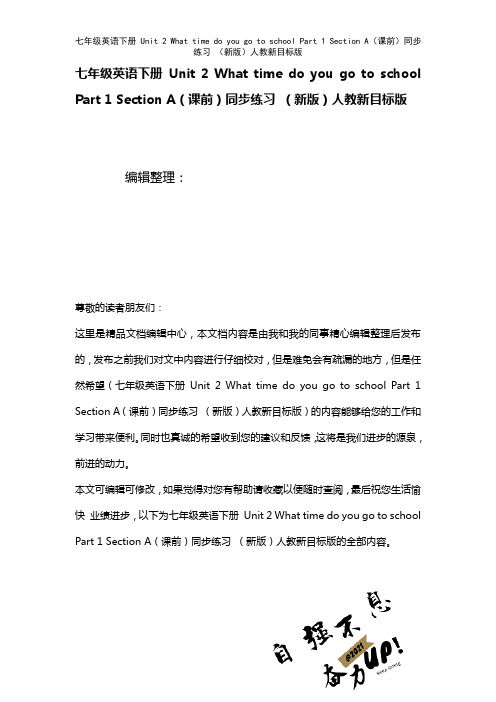
七年级英语下册Unit 2 What time do you go to school Part 1 Section A(课前)同步练习(新版)人教新目标版编辑整理:尊敬的读者朋友们:这里是精品文档编辑中心,本文档内容是由我和我的同事精心编辑整理后发布的,发布之前我们对文中内容进行仔细校对,但是难免会有疏漏的地方,但是任然希望(七年级英语下册Unit 2 What time do you go to school Part 1 Section A(课前)同步练习(新版)人教新目标版)的内容能够给您的工作和学习带来便利。
同时也真诚的希望收到您的建议和反馈,这将是我们进步的源泉,前进的动力。
本文可编辑可修改,如果觉得对您有帮助请收藏以便随时查阅,最后祝您生活愉快业绩进步,以下为七年级英语下册Unit 2 What time do you go to school Part 1 Section A(课前)同步练习(新版)人教新目标版的全部内容。
Unit 2 What time do you go to schoolPart 1 Section A(课前)——自主预习,扫清障碍一、Section A单词预习。
1.向上 up2.起床;站起 get up 3.穿衣服;连衣裙 dress 4.刷;刷净;刷子 brush 5.牙齿 tooth6.淋浴 shower 7.通常地;一般地 usually8.四十 forty9.从不;决不 never10.早(的) early11.五十 fifty12.工作;职业 job13.工作 work14.电(视)台;车站 station15.(表整点)……点钟o'clock16.晚上;夜晚 night17.滑稽好笑的 funny18.锻炼;练习 exercise二、Section A重点短语及目标句型预习。
1.What time do you usually get up?你通常几点起床?up 向上; get up起床玛丽通常几点起床? What time does Mary usually get up?up的短语归纳:◎ come up with a good idea 想出一个好主意◎ up and down 上上下下◎ clean up 收拾干净◎ eat up 吃光◎ get up 起床◎ grow up 长大◎ give up doing sth.放弃做某事◎ hands up 举起手来◎ look up 查阅(字典); 向上看◎ pick up 捡起◎ put up 举起◎ stand up 起立;站立◎ make up 编造◎ call up 给……打电话2.What time do you usually get dressed?你通常几点穿好衣服?(1)dress sb。
人教版七年级英语下册《Unit 2 What time do you go to school》(含

《Unit 2 What time do you go to school》(含5课时)导学案【学习目标】1. 正确听、说、读、写section A 单词。
2. 运用“what time”和“where”引导的特殊疑问句询问并回答日常活动的时间。
【学习重点】熟练运用“what time”和“where”引导的特殊疑问句。
【学习难点】准确使用“what time”和“where”引导的特殊疑问句询问并回答。
【学习流程】一、自主学习(教师寄语:Knowledge is power.知识就是力量.)学习任务一:会读写、本课4个单词及7个短语.1、个人自读、记忆本课单词.2、小组互相检查单词读的情况.3、小组内竞赛,看谁记得快、准,并展示(默写)单词: 锻炼;练习___________ 淋浴,淋浴器___________通常___________ 刷;刷净___________短语:几点,什么时候_________________ 穿上衣服_________________ 洗淋浴_________________ 吃早饭_________________广播电台_________________ 刷牙_________________4、认真观察1a的图画,将词语与图片搭配,并核对答案。
二、交流展示学习任务二:运用句型What time ...?谈论Rick的日常生活.1、熟读1a中的对话,理解并复述.2、小组为单位,两人合作,谈论Rick的日常生活(分别扮演Rick和采访者).3、熟读2d中的对话,理解并复述.4、小组为单位,两人合作,角色扮演Scott和采访者.【合作共建】小组讨论该如何表达时间?写出下列时间.9:00 ________________ 11:00 ____________10:30 _______________ 12:50 ____________三、知识反馈(一)根据汉语完成句子1. 我早上六点起床.I ______ ______ _______ six in the morning.2.他的爸爸晚上九点洗澡.His father ______ ______ _______ ____ nine in the evening.3.你每天早上七点跑步吗?_____ you _______ ______ seven every morning?4.你姐姐几点吃晚饭?______ ______ _____ your sister eat _______?5.我上班从不迟到.I’m_______ _____ ______ work.6.他十二点吃午饭.He ______ _____ at twelve.(二)句型转换,按要求改写句子.1.Alice takes a shower at 9:00.(提问划线部分)__________________________________________?2.I have some tea in my cup.(改为否定句)__________________________________________.3.The old man is seventy.( 提问划线部分)__________________________________________.四、学后反思____________________________________________专注:心无旁骛,万事可破Unit 2 What time do you go to school?第2课时【学习目标】1.熟练掌握本课的单词和部分短语.2.熟练运用句型询问时间,以及在某个时间干什么事What's the time? It's…What time do you usually…? I usually…at…3.能根据要求写出简单的句子表述自己和他人的日常活动.【学习重点】能根据要求写出简单的句子表述自己和他人的日常活动.【学习难点】一般现在时中不同人称对应的动词的变化形式.【学习流程】一、自主学习(教师寄语:Knowledge is power.知识就是力量.)学习任务一: 读写、记忆本课单词和短语.1.个人自读,记忆.2.小组互相检查读、写情况.3.根据汉语写出下列英语单词和短语并展示.单词:最好的_________ 小时_________ 组;群________ 牙齿__________ 短语:在周末_______________ 去上班_______________二、交流展示学习任务二: 通过练习描述一天的时间1. Grammar Focus2. Writing(3a,3b)3. Survey (3c)学习任务三:试着模仿说出自己的一天的活动三、知识反馈专注:心无旁骛,万事可破(一)单项选择1. The bus usually ________ him to work.A. takeB. takesC. /D. bring2. I usually go to school _________ seven o'clock..A. atB. inC. onD. for3. — What's the time? —__________ nine-fifteen.A. The time isB. It'sC. AtD. This is4.We go to ________at six thirty in the morningA. the schoolB. a schoolC. schoolD. schools(二)用括号内所给词的适当形式填空1.Alice brushes her __________(tooth) every morning.2.I t’s __________(fun) to play volleyball on the beach(沙滩).3.I usually get __________ (dress) at six in the morning.4.Tom is my __________ (good) friend in my class.5.My father __________ (work) in a school.四、学后反思____________________________________________专注:心无旁骛,万事可破Unit 2 What time do you go to school?第3课时【学习目标】1.正确听、说、读、写section B单词.2.能够利用所学句型询问及表述时间.3. 学会谈论自己或别人的日常生活,询问及表述时间.【学习重点】学会谈论自己或别人的日常生活,询问及表述时间。
初中英语七年级下册 Unit2 what time do you go to school.Sect
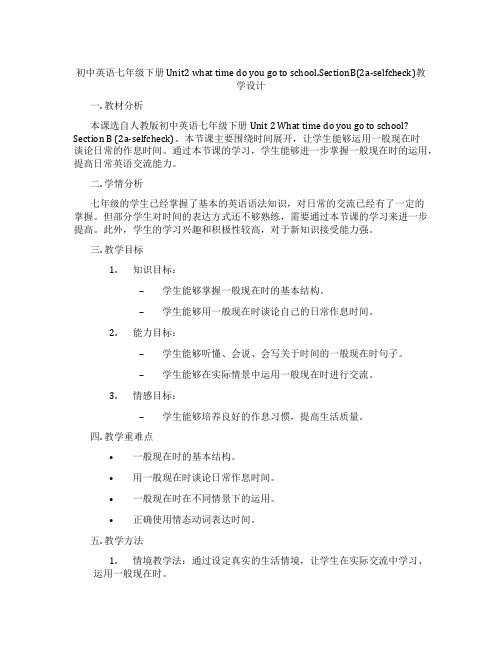
初中英语七年级下册 Unit2 what time do you go to school.SectionB(2a-selfcheck)教学设计一. 教材分析本课选自人教版初中英语七年级下册Unit 2 What time do you go to school? Section B (2a-selfcheck)。
本节课主要围绕时间展开,让学生能够运用一般现在时谈论日常的作息时间。
通过本节课的学习,学生能够进一步掌握一般现在时的运用,提高日常英语交流能力。
二. 学情分析七年级的学生已经掌握了基本的英语语法知识,对日常的交流已经有了一定的掌握。
但部分学生对时间的表达方式还不够熟练,需要通过本节课的学习来进一步提高。
此外,学生的学习兴趣和积极性较高,对于新知识接受能力强。
三. 教学目标1.知识目标:–学生能够掌握一般现在时的基本结构。
–学生能够用一般现在时谈论自己的日常作息时间。
2.能力目标:–学生能够听懂、会说、会写关于时间的一般现在时句子。
–学生能够在实际情景中运用一般现在时进行交流。
3.情感目标:–学生能够培养良好的作息习惯,提高生活质量。
四. 教学重难点•一般现在时的基本结构。
•用一般现在时谈论日常作息时间。
•一般现在时在不同情景下的运用。
•正确使用情态动词表达时间。
五. 教学方法1.情境教学法:通过设定真实的生活情境,让学生在实际交流中学习、运用一般现在时。
2.任务型教学法:通过完成小组任务,激发学生的学习兴趣,提高合作能力。
3.游戏教学法:通过设计有趣的游戏,让学生在轻松愉快的氛围中学习英语。
六. 教学准备1.教材:人教版初中英语七年级下册Unit 2 What time do you go to school? Section B (2a-selfcheck)。
2.多媒体设备:电脑、投影仪、音响等。
3.教学素材:相关时间图片、视频、录音等。
4.教学卡片:用于游戏环节。
七. 教学过程1.导入(5分钟)–教师与学生用英语进行简单的问候,营造轻松愉快的课堂氛围。
七年级英语下册Unit2 What time do you go to school-重要知识点汇总
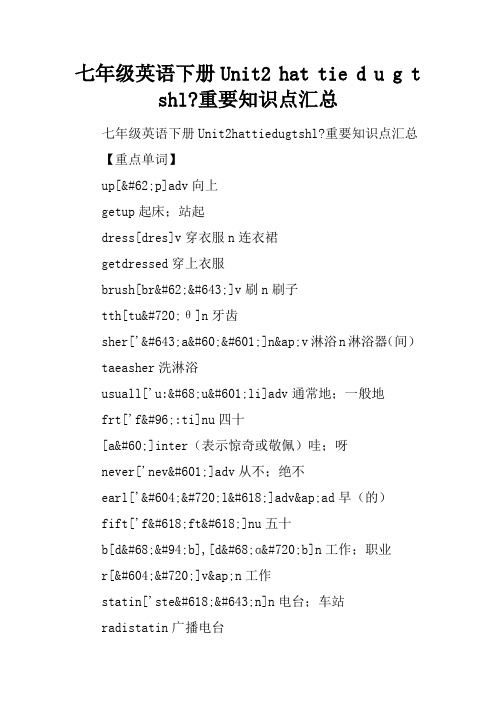
七年级英语下册Unit2 hat tie d u g t shl?重要知识点汇总七年级英语下册Unit2hattiedugtshl?重要知识点汇总【重点单词】up[>p]adv向上getup起床;站起dress[dres]v穿衣服n连衣裙getdressed穿上衣服brush[br>ʃ]v刷n刷子tth[tuːθ]n牙齿sher['ʃa<ə]n≈v淋浴n淋浴器(间)taeasher洗淋浴usuall['u:Duəli]adv通常地;一般地frt['f`:ti]nu四十[a<]inter(表示惊奇或敬佩)哇;呀never['nevə]adv从不;绝不earl['ɜːlɪ]adv≈ad早(的)fift['fɪftɪ]nu五十b[dD^b],[dDɑːb]n工作;职业r[ɜː]v≈n工作statin['steɪʃn]n电台;车站radistatin广播电台'l[ə'l^],[ə'lɑ:]adv(表示整点)……点钟night[naɪt]n晚上;夜晚funn['f>nɪ]ad奇怪的;滑稽好笑的exerise['esəsaɪz]v≈n锻炼;练习neeends周末best[best]ad最好的adv最好地;最grup[gruːp]n组;群half[hɑːf],[hæf]n≈prn一半;半数past[pɑːst],[pæst]prep晚于;过(时间)ad过去的quarter['`ːtə]n一刻钟;四分之一her['hə<ɜː]n家庭作业dher做作业run[r>n]v跑;奔lean[liːn]v打扫;弄干净ad干净的al[`ː]n≈v行走;步行taeaal散步;走一走quil['ɪli]adv很快地either['aɪðə],['iːðə]ad v或者;也(用在否定词组后)either…r…要么……要么……;或者……或者……lt[l^t],[lɑ:t]prn大量;许多ltsf大量;许多seties['s>taɪz]adv有时taste[teɪst]v有……的味道;品尝n味道;滋味life[laɪf]n生活;生命【重点短语】gtshl去上学2getup起床3getdressed穿衣服4brushteeth刷牙eatbreafast吃早饭6taeasher洗澡7hattie什么时间8atsixfrt在六点四十9aninterestingb一个有趣的工作0attheradistatin在广播电视台1usuall/alas/ften/seties/never经常/总是/经常/有时/从不2urradish你的广播节目3fr…t从…到…4atnight在夜晚afunntie一个有趣的时间6taeexerise锻炼7belatefr…因…迟到8atabuttentent在大约十点二十9neeends在周末20nshldas在上学日21halfpastsix六点半22aquarterpastthree三点过一刻(3:1)23aquartertten十点差一刻(9:4)24d(ne’s)her做(某人的)家庭作业2taeaal散步26gtbed睡觉27eatquil吃得快28haveuhtie有许多时间29halfanhur半个小时30gethe到达家31either…r或者……或者32eatagdbreafast好好吃顿早餐33ltsf=altf许多34begdfr…对……有益3tastegd尝起来好36dherher做她的家庭作业37haveahealthlife有一个健康的生活方式38havedinner吃晚饭【重点句型】hattiedugtshl?你几点去上学?2一hattieduusualltaeasher,i?瑞克,你通常几点钟淋浴?—Iusualltaeasheratsixfrt我通常六点四十淋浴。
七年级英语下册 Unit 2 What time do you go to school Secti

七年级英语下册 Unit 2 What time do you go to school Section A(第1课时)说课稿一. 教材分析《新目标》七年级英语下册Unit 2 What time do you go to school Section A(第1课时)主要讨论日常生活中的一般现在时。
本节课主要介绍一般现在时的构成和用法,以及如何用一般现在时描述日常生活中的习惯和规律。
教材通过丰富的情境和真实的语境,让学生在实践中掌握一般现在时的基本知识,提高运用英语进行交流的能力。
二. 学情分析面对七年级的学生,他们已经掌握了一定的英语基础,能够进行简单的英语交流。
但同时,他们还在适应初中英语的学习节奏,需要更多的鼓励和引导。
针对这个年龄段的学生,我们需要设计富有激情和互动性的课堂,充分调动他们的学习积极性。
三. 说教学目标1.知识目标:学生能够掌握一般现在时的构成和基本用法,理解主语和动词之间的关系。
2.能力目标:学生能够在适当的情境中运用一般现在时进行描述和交流,提高英语表达能力。
3.情感目标:激发学生对英语学习的兴趣,培养他们积极向上的学习态度。
四. 说教学重难点1.教学重点:一般现在时的构成和基本用法。
2.教学难点:一般现在时在实际语境中的运用。
五. 说教学方法与手段为了提高课堂效果,本节课将采用任务型教学法,情境教学法,合作学习法和激励性评价等教学方法。
同时,利用多媒体课件、图片、卡片等教学手段,增加课堂的趣味性和互动性。
六. 说教学过程1.导入:通过提问学生日常生活中的习惯,引入一般现在时的主题。
2.呈现:利用课件展示一般现在时的构成和用法,让学生初步感知。
3.practice:设计不同情境,让学生分组练习,运用一般现在时进行描述和交流。
4.拓展:引导学生运用一般现在时描述自己的家庭成员和朋友,提高他们的实际运用能力。
5.总结:对本节课的内容进行总结,强调一般现在时的构成和用法。
6.布置作业:让学生运用一般现在时完成相关练习,巩固所学知识。
七年级下册英语《Unit 2 What time do you go to school-Section A 1a-1c》

七年级下册英语《Unit 2 What time do you go to school》Section A 1a-1cLearning objectives1. To learn some new words and expressionsusually; brush; tooth; shower; dress;get up; eat breakfast; brush teeth; get dressed; go to school2. To talk about routines with the target structures:What time do you usually get up?I usually get up at eight.3. To ask about and say times:What time is it? It’s six o’clock.What’s the time? It’s six thirty.Words and Expressionsusually adj.通常,经常get up 起床brush v.刷,刷洗;n.刷子eat/have breakfast 吃早餐tooth-teeth n.牙齿brush (one’s) teeth 刷牙shower n./v.淋浴;浴室get dressed 穿衣服dress v.穿衣服n.连衣裙go to school 上学时间表达法1.整点:基数词(+o’clock)e.g. It’s twelve/twelve o’clock2.顺读法:钟点数+分钟数e.g. It’s eight thirty.Numbers1-12one two three four five six seven eight nine ten eleven twelve13-19thir teen four teen fi f teen six teen seven teen eigh t een nine teen“整十”twen ty thir ty f or ty fi f ty six ty…20 30 40 50 60“几十几”forty-five 45 twenty-five 25Listen and repeatG: What time do you usually get up, Rick?R: Um, I usually get up at six thirty.G: And what time do you brush your teeth and take a shower?R: I brush my teeth and take a shower at forty.G: Hmm, what time do you eat breakfast?R: Seven o’clock.G: And what time do you usually get dressed?R: I usually get dressed at seven twenty.G: What time do you go to school?R: I usually go to school at seven thirty.G: Thank you.翻译1. Time and tide wait for no man.时不待我2. We should cherish time and have good habits.我们要珍惜时间,养成好习惯。
初中英语七年级下册 Unit2 what time do you go to school.Sect

初中英语七年级下册 Unit2 what time do you go to school.SectionB(1a-1e)教学设计一. 教材分析本节课是初中英语七年级下册Unit2 What time do you go to school?Section B (1a-1e)的教学设计。
本节课主要围绕时间展开,通过描述日常活动和时间来培养学生的听说读写能力。
1a-1c是听力练习,1d是口语练习,1e是书写练习。
教材内容贴近学生生活,有利于激发学生的学习兴趣。
二. 学情分析七年级的学生已经掌握了基本的英语语法和词汇,对日常生活中的交际用语有一定的了解。
但部分学生对英语学习的兴趣不高,学习积极性有待提高。
此外,学生的听说能力相对较弱,需要通过大量的练习来提高。
三. 教学目标1.能听懂、会说、会读、会写本节课的生词和短语。
2.能用英语简单描述日常活动和时间。
3.提高学生的听说能力,培养学生的交际意识。
4.激发学生学习英语的兴趣,提高学习积极性。
四. 教学重难点1.重点:掌握本节课的生词和短语,能用英语简单描述日常活动和时间。
2.难点:正确运用一般现在时描述日常活动和时间。
五. 教学方法1.任务型教学法:通过完成各种任务,激发学生的学习兴趣,提高学生的参与度。
2.交际法:通过模拟真实场景,培养学生的交际能力。
3.游戏教学法:通过趣味游戏,巩固所学知识,提高学生的学习积极性。
六. 教学准备1.准备教材、课件、录音机、磁带等教学用品。
2.提前让学生预习,了解本节课的生词和短语。
3.准备相关的时间物品,如手表、闹钟等,以便进行课堂展示。
七. 教学过程1.导入(5分钟)利用图片或实物展示与时间相关的物品,如手表、闹钟等,引导学生谈论时间。
询问学生:“What time is it? Do you know?”,激发学生的兴趣。
2.呈现(10分钟)播放1a的录音,让学生跟读。
然后展示1a的图片,让学生看图说话,描述图片中的活动和时间。
七年级英语下册 Unit 2 What time do you go to schoo
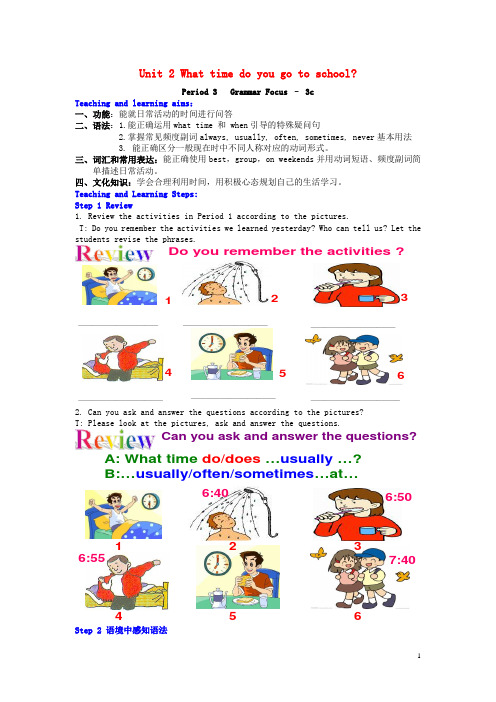
Unit 2 What time do you go to school?Period 3 Grammar Focus – 3cTeaching and learning aims :一、功能:能就日常活动的时间进行问答二、语法:1.能正确运用what time 和 when 引导的特殊疑问句2.掌握常见频度副词always, usually, often, sometimes, never 基本用法3. 能正确区分一般现在时中不同人称对应的动词形式。
三、词汇和常用表达:能正确使用best ,group ,on weekends 并用动词短语、频度副词简单描述日常活动。
四、文化知识:学会合理利用时间,用积极心态规划自己的生活学习。
Teaching and Learning Steps:Step 1 Review1. Review the activities in Period 1 according to the pictures.T: Do you remember the activities we learned yesterday? Who can tell us? Let the Do you remember the activities ____________________________________________________________________________________________________________23462. Can you ask and answer the questions according to the pictures? T: Please look at the pictures, ask and answer the questions. Can you ask and answer the questions?1234566:406:506:557:40Step 2 语境中感知语法Ask students some questions, and have them try to answer using the complete GF at six thirty.Read and find out the structures of sentences.GF at six thirty.What time QuestionsRead and find out the structures of sentences.在操练的基础上归纳语言形式,在体验的基础上引导学生归纳,在教师引导下,鼓励学生有声思维。
七年级英语下册 Unit 2 What time do you go to school Secti

UNIT 2 What time do you go to school?Section A 第1课时(1a~1c)自主学习方案1. 自学生词,并记住拼读及拼写。
2. 预习课本找出重点短语及句子。
(见学案自学导练内容)3. 读记后完成自学导练内容。
课堂导学方案Step1 情景导入利用图片或多媒体给学生展示时间,教师问:What time is it? Can you tell me?Let’s learn how to say time in English.教师可以自己回答一、两个时间,然后让学生回答。
—What time is it?—It,s two (o’clock)/two twenty.环节说明:开门见山的提出本节课的学习重点—时间表达法。
Step 2完成教材1a—1c的任务1. 教师领读1a中的词组,学生识记并且将活动和图片中的人物匹配。
(3分钟)2. 以小组为单位说出1a图片上时钟显示的时间,练习时间表达方法。
(3分钟)3. 认真听录音,将所进行的活动和时间相匹配。
完成课本1b的听力任务。
(2分钟)4. 再听一遍录音,并跟读,模仿语言语调。
(2分钟)5. 仿照1c中的对话,利用1b的听力信息和同伴练习新对话,并邀请几组同学来表演对话。
(5分钟)参考案例:6.小结训练。
(5分钟)(1)我早上六点起床。
I get up at six in the morning.(2)他的爸爸晚上九点洗澡。
His father takes a shower at nine in the evening.(3)你姐姐几点刷牙?What time does your sister brush teeth?(4)写出下列时间。
8:00 eight (o’clock)9:02 nine off two11:25 eleven twenty—five环节说明:听说结合,第一时间向学生传达语言目标,通过结对对话练习和小结训练,语言目标得以强化。
七年级英语下册 Unit 2 What time do you go to school(第1课时)

Unit2.What time do you go to school?第一课时教学内容:SectionA1a-2b课型:词汇和听力教学教学目标:1.谈论日常工作和生活,学会询问和表达时间;2.掌握一些重点词汇及学习询问时间的句型3.培养学生合理安排他们时间的能力教学重点:重点词汇及短语教学难点:谈论日常工作和生活,学会询问和表达时间教学过程:活动一:旧知反馈一.拼写1-10的英文____.____.____.____.____.____.____.____.____.____. 二.活动二:试一试,你行的!看图表尝试说出钟表的时间。
What’s the time now?It’s…What time is it now? It’s…活动三:自主学习一.学习1a中的短语,进行游戏。
(小组进行肢体展示,组员进行短语表述)二.将下面的汉语意思与英语词组匹配①起床②穿上衣服③刷牙④洗淋浴⑤吃早饭⑥去上学get dressed_____ go to school_____eat breakfast_____take a shower____get up________brush teeth______三.将1a中的活动与图片匹配起来,完成1a.四.尝试表达一下日常生活和工作安排如:I get up at six,too.活动四:听力训练一.听出各种活动的具体时间,将钟和图片连线,完成1b。
二.尝试复述-What time do you usualy get up,Rick?-I usually get up at _________活动五:口语展示一.小组之间关于Rick’s day 进行问答讨论。
二.小组成员进行展示问与答。
三.小组成员之间谈论一下自己的日常生活和工作安排。
活动六:听力训练一.听对话完善句子,学习2a活动六:合作探究课外拓展1. at作为介词,意为“在…”,可用来表示时间,其后接____________.或接一些习惯用语。
七年级下册unit2-What-time-do-you-go-to-school-知识点讲解与练习
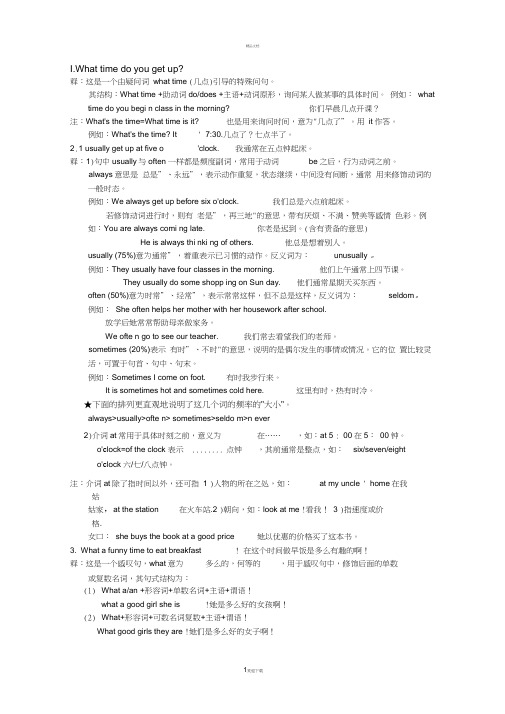
I.What time do you get up?释:这是一个由疑问词what time (几点)引导的特殊问句。
其结构:What time +助动词do/does +主语+动词原形,询问某人做某事的具体时间。
例如:what time do you begi n class in the morning? 你们早晨几点开课?注:What's the time=What time is it? 也是用来询问时间,意为"几点了”。
用it作答。
例如:What's the time? It ' 7:30.几点了?七点半了。
2.1 usually get up at five o 'clock. 我通常在五点钟起床。
释:1)句中usually与often 一样都是频度副词,常用于动词be之后,行为动词之前。
always意思是总是”、永远”,表示动作重复,状态继续,中间没有间断,通常用来修饰动词的一般时态。
例如:We always get up before six o'clock. 我们总是六点前起床。
若修饰动词进行时,则有老是”,再三地"的意思,带有厌烦、不满、赞美等感情色彩。
例如:You are always comi ng late. 你老是迟到。
(含有责备的意思)He is always thi nki ng of others. 他总是想着别人。
usually (75%)意为通常”,着重表示已习惯的动作。
反义词为:unusually 。
例如:They usually have four classes in the morning. 他们上午通常上四节课。
They usually do some shopp ing on Sun day. 他们通常星期天买东西。
often (50%)意为时常”、经常”,表示常常这样,但不总是这样,反义词为:seldom。
- 1、下载文档前请自行甄别文档内容的完整性,平台不提供额外的编辑、内容补充、找答案等附加服务。
- 2、"仅部分预览"的文档,不可在线预览部分如存在完整性等问题,可反馈申请退款(可完整预览的文档不适用该条件!)。
- 3、如文档侵犯您的权益,请联系客服反馈,我们会尽快为您处理(人工客服工作时间:9:00-18:30)。
Unit2词组1.get up at five forty 五点四十起床2.go toschool six fifty 六点五十去上学3.get dressed at 6;00 o’clock 六点穿好衣服4.brush teeth at 7;10 七点十分刷牙5.eat breakfast at 7;30 七点半吃早餐6.take a shower at a quarter to nine in the evening 晚上八点四十五洗澡7.have an interesting job 有一份有趣的工作8.work at a radio station 在广播站工作9.That’s a funny time for breakfast 那个时间吃早餐真有意思10.get up early on school days 上学日起床早11.never exercise on weekends 周末从不锻炼12.play basketball for half an hour after school 放学后打半个小时篮球13.get home at six o’clock in the evening 晚上六点到家14.eat a good breakfast 吃一顿丰盛的早餐15.eat lots of fruit and vegetables for lunch 午餐吃很多水果和蔬菜16.after lunch/ after dinner/after breakfast 午餐,晚餐,早餐后17.taste good 尝起来好吃18.go to bed late 睡觉晚19.have a very healthy life 有一种很健康的生活20.have a shower quickly 洗澡很快21.have no time to take a walk from Monday to Friday 周一到周五没时间散步22.be late for school=go to school late 上学迟到23.play sports after school 放学后做运动24.in our group 在我们组25.be good for---/be bad for--- 对—有好处、有坏处26.either watch TV or play computer games 要么看电视,要么玩电脑游戏重要句型1.What time do you usually take a shower? 你通常几点洗澡?2.I usually take a shower at a quarter to eight. 我通常七点四十五分洗澡。
3.When does Scott often go to work? Scott 经常什么时候上班?4.He always goes to work at seven o’clock. 他经常七点去上班。
5.When do your friends exercise? 你朋友们什么时候锻炼?6.We often exercise on weekends. 我们经常在周末运动7.I don’t have much time for lunch. 我没有很多时间吃午餐8.I either watch TV or take exercise on weekends. 在周末,我要么看电视,要么做运动常见谚语1. A good medicine tastes bitter. 良药苦口利于病2. A good beginning is half done. 良好的开端是成功的一半3. Do nothing by halves. 凡事不可半途而废4. It is never too old to learn. 活到老,学到老5. Time is money. 一寸光阴一寸金6. Do as the Romans do. 入乡随俗7. A snow year, a rich year. 瑞祥兆丰年8. Like father, like son. 有其父必有其子9. Seeing is believing. 眼见为实10. Don't trouble trouble until trouble troubles you. 不要自找麻烦新七下Unit 2 试题姓名______________ 班级___________ 分数______________ 一.单选30%(每题2分)( )1.--_____ does he go to bed on weekdays? --At 10 o’clock. A.What B.Why C.What time D.How long( )2.That’s a funny time _____ breakfast! A. in B.for C.at D.of( )3.Bob always gets ______ at 6;30. A.dress B.dresses C.dressing D.dressed( )4.Eric doesn’t like ice-cream and he ______ eats it. A.always B.sometimes C.never ually( )5.I don’t like carrots, they don’t _____ good. A.eat B.looks C.taste D.have( )6.Mike either sings _____ the piano on weekends. A.or play B.and play C.but play D.or plays( )7.—Is it ____ boring job? –No, it is ____ interesting work. A.a, an B.an, a C./,a D.a,/( )8.After___ dinner, he plays ____ guiter. A. the, the B./, / C./, the D.the, /( )9.I often take ___ walk in ____ afternoon. A.a, a B.a, the C.the, / D. the, the( )10.Either you or Tim _____ the room every day. A.clean B.cleans C.to clean D.cleaning( )11.My mother usually takes a walk _____hour. A. in an B.for a C.at an D.for an ( )12.I often get ____home late,but I always get _____ school early. A.to, to B./,to C. /,/ D.to, /( )13.You should do eye _____ , it is good to take ______ every day.A.exercise, exerciseB.exercises, exerciseC.exercises, exercisesD.exercise, exercises( )14.We have math class ___ Monday ___ Friday. A.on,on B.both,and C.from ,to D.either,or( )15.My mother is busy with housework at home on weekends, but she ____ goes shopping and buys many things gor me. A.never B.sometimes C.some times D. sometime二词汇20% 1.The baby has eight ________ now, he can eat some vegetables.2.Scott works at n________ , he sleeps in the day.3.Let’s meet at the radio s_________.4.Twenty and twenty is ________.5.He eatslunch________(quick).6. We have Chinese at a __________ past nine a.m.7.He often takes a s_______ on Sunday.8.My mother usually e_________ in the morning, so she is healthy. 9.Babies can’t d________themselves.10.He often tells us f______ stories and we often laugh when we hear them.三.动词20% 1.What time ____ Bob and Eric _____(go) to work on weekdays?2.She sometimes ________(brush) her teeth after lunch.3.That’s a funny time__________(have) breakfast.4.He always ______(go) to bed early ,he never ______(exercise) in the morning.5. It’stime ______(get) up.6.Tony___________(not do) his homework on wekends, he only ________(watch) TV.7.Both Lily and I ______(be) right, either Tom or you _____(be) wrong.8.We are always busy _____(do) our homework on Sundays we don’t have much time ________(play)games. 9.Half of the apples in the box ________(not be) fresh(新鲜).10.I often help Tom________(clean) the room after school.四.句型20%.1.We often go to school at 6;30 a.m.(划线)_____ _____ do you often go to school a.m?2.He always takes a walk in the evening.(划线提问)_____ ______ he always take a walk?3.They often exercise on weekends. (划线提问)_______ do they often_______ on weekends?4.Miss Li works in a middle school. (划线提问)_______ ________ Miss Li work ?5.He is often ____ _____ work.=He often goes to work late6.It is six thirty.= It is half_____ six.7.We have dinner at 6;45.= We have dinner at _____ _________ ________ seven. 8. I don’t have time for sports.= I have no time _____ ______ sports. 9.We have much homework on weekends.= We have _____ ______ homework. 10.We often run for an hour(划线) _____ ______ do you often run?五.补全对话10%A; Tom, _________________________? B; well, I get up at 6;00, so I never go to school late.A;Do you have breakfast at home? B;Yes,__________________________________.A;And when do you go to school? B; Class begins at 8;00, so _____________________at 7;30.A;__________________________? B; I usually have lunch at school, sometimes I have lunch at home.A;___________________________? B; I usually get home at 6;45.。
